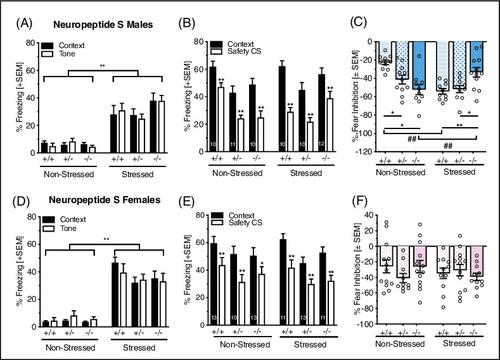当前位置:
X-MOL 学术
›
Genes Brain Behav.
›
论文详情
Our official English website, www.x-mol.net, welcomes your
feedback! (Note: you will need to create a separate account there.)
Neuropeptide-S-receptor deficiency affects sex-specific modulation of safety learning by pre-exposure to electric stimuli.
Genes, Brain and Behavior ( IF 2.4 ) Pub Date : 2020-01-02 , DOI: 10.1111/gbb.12621 Judith C Kreutzmann 1, 2 , Radwa Khalil 1 , Jana C Köhler 3, 4 , Dana Mayer 1 , Antonio Florido 5 , Roser Nadal 5, 6, 7 , Raül Andero 5, 6, 7 , Markus Fendt 1, 4
Genes, Brain and Behavior ( IF 2.4 ) Pub Date : 2020-01-02 , DOI: 10.1111/gbb.12621 Judith C Kreutzmann 1, 2 , Radwa Khalil 1 , Jana C Köhler 3, 4 , Dana Mayer 1 , Antonio Florido 5 , Roser Nadal 5, 6, 7 , Raül Andero 5, 6, 7 , Markus Fendt 1, 4
Affiliation

|
Neuropeptide S (NPS) is a neuropeptide involved in the regulation of fear. Because safety learning is impaired in patients suffering from anxiety-related psychiatric disorders, and polymorphisms of the human neuropeptide S receptor (NPSR) gene have also been associated with anxiety disorders, we wanted to investigate whether NPSR-deficiency interferes with safety learning, and how prior stress would affect this type of learning. We first investigated the effect of pre-exposure to two different types of stressors (electric stimuli or immobilization) on safety learning in female and male C57Bl/6 mice, and found that while stress induced by electric stimuli enhanced safety learning in males, there were no differences in safety learning following immobilization stress. To further investigate the role of the NPS system in stress-induced modulation of safety learning, we exposed NPSR-deficient mice to stress induced by electric stimuli 10 days before safety learning. In nonstressed male mice, NPSR-deficiency enhanced safety learning. As in male C57Bl/6 mice, pre-exposure to electric stimuli increased safety learning in male NPSR +/+ mice. This pre-exposure effect was blocked in NPSR-deficient male mice showing impaired, but still intact, safety learning in comparison to their NPSR +/+ and NPSR +/- littermates. There was neither a pre-exposure nor a genotype effect in female mice. Our findings provide evidence that pre-exposure to stress induced by electric stimuli enhances safety learning in male mice, and that NPSR-deficiency prevents the beneficial effect of stress exposure on safety learning. We propose an inverted U-shape relationship between stress and safety learning.
中文翻译:

神经肽-S-受体缺乏症通过预先暴露于电刺激下影响安全学习的性别特异性调制。
神经肽S(NPS)是一种参与恐惧调节的神经肽。由于患有焦虑相关精神病的患者的安全学习受到损害,并且人类神经肽S受体(NPSR)基因的多态性也与焦虑症相关,因此我们想研究NPSR缺乏是否会干扰安全学习,以及如何先前的压力会影响这种学习方式。我们首先研究了预先暴露于两种不同类型的压力源(电刺激或固定化)对雌性和雄性C57Bl / 6小鼠安全学习的影响,并发现尽管电刺激引起的压力增强了雄性安全学习,但仍有固定压力后安全学习无差异。为了进一步研究NPS系统在应激诱导的安全学习调节中的作用,我们在安全学习前10天将NPSR缺陷小鼠暴露于电刺激诱导的应激中。在无压力的雄性小鼠中,NPSR缺乏会增强安全性学习。如在雄性C57Bl / 6小鼠中一样,预先暴露于电刺激中会增加雄性NPSR + / +小鼠的安全性学习。与NPSR + / +和NPSR +/-同窝仔相比,在NPSR缺乏的雄性小鼠中,这种暴露前效应被阻断,显示出受损的但仍然完整的安全性学习。在雌性小鼠中既没有预暴露也没有基因型效应。我们的发现提供了证据,即预先暴露于电刺激引起的应激会增强雄性小鼠的安全学习,而NPSR缺乏会阻止应激暴露对安全学习的有益影响。
更新日期:2020-03-27
中文翻译:

神经肽-S-受体缺乏症通过预先暴露于电刺激下影响安全学习的性别特异性调制。
神经肽S(NPS)是一种参与恐惧调节的神经肽。由于患有焦虑相关精神病的患者的安全学习受到损害,并且人类神经肽S受体(NPSR)基因的多态性也与焦虑症相关,因此我们想研究NPSR缺乏是否会干扰安全学习,以及如何先前的压力会影响这种学习方式。我们首先研究了预先暴露于两种不同类型的压力源(电刺激或固定化)对雌性和雄性C57Bl / 6小鼠安全学习的影响,并发现尽管电刺激引起的压力增强了雄性安全学习,但仍有固定压力后安全学习无差异。为了进一步研究NPS系统在应激诱导的安全学习调节中的作用,我们在安全学习前10天将NPSR缺陷小鼠暴露于电刺激诱导的应激中。在无压力的雄性小鼠中,NPSR缺乏会增强安全性学习。如在雄性C57Bl / 6小鼠中一样,预先暴露于电刺激中会增加雄性NPSR + / +小鼠的安全性学习。与NPSR + / +和NPSR +/-同窝仔相比,在NPSR缺乏的雄性小鼠中,这种暴露前效应被阻断,显示出受损的但仍然完整的安全性学习。在雌性小鼠中既没有预暴露也没有基因型效应。我们的发现提供了证据,即预先暴露于电刺激引起的应激会增强雄性小鼠的安全学习,而NPSR缺乏会阻止应激暴露对安全学习的有益影响。











































 京公网安备 11010802027423号
京公网安备 11010802027423号